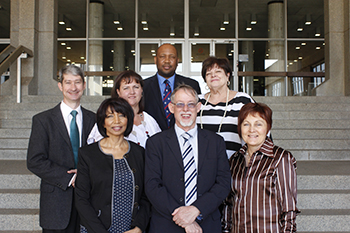Latest News Archive
Please select Category, Year, and then Month to display items
21 August 2019
|
Story Thabo Kessah
|
Photo Thabo Kessah
 Keafon Jumbam is gearing herself for the institutional Three Minute Thesis competition.
Keafon Jumbam is gearing herself for the institutional Three Minute Thesis competition.
Keafon Jumbam is a PhD candidate whose research on food and foxes has won her the first prize of R8 000 in the recent Faculty of Natural and Agricultural Sciences’ Postgraduate Flash Fact Competition. Her brief in the competition was to
summarise her research in three minutes, using only one static slide.“The competition started at departmental level on both campuses. The idea was that the best student in each department is then selected to go for the faculty-level competition on the Bloemfontein Campus. Summarising the entire research into three minutes is no easy feat, but a great way to gauge how well one has mastered your work,” she said.
Far-reaching research
“Thought-provoking presentations on research, ranging from technology to track academic progress, traditional medicine as alternatives to expensive prescriptions, and suggesting insects as food alternatives to curb hunger in this era of severe droughts and food shortages. The competition was tough, but it highlighted the level of research competitiveness on the Qwaqwa Campus. I hope that more students will join in such opportunities to build themselves up and to showcase our research output as Qwaqwa students,” added Jumbam from the
Department of Zoology and Entomology.
Institutional finals
Her next challenge is the institutional competition to be held on 23 August 2019, which could qualify her for the national competition.
New schools, restructuring part of streamlined Faculty of Health Sciences
2017-10-12

From the left, front are: Dr Jocelyn Naicker,
Prof Gert van Zyl, Prof Magda Mulder;
back from left: Prof Chris Viljoen,
Marlene Viljoen, Deputy Director: Faculty of Health Sciences;
Prof Nathaniel Mofolo; and Prof Santie van Vuuren.
Photo: Rulanzen Martin
Numerous developments, such as the creation of two new schools and one newly restructured School of Medicine in the Faculty of Health Sciences at the University of the Free State (UFS), will catapult this renowned faculty to even greater heights.
Five-school structure to increase access
A five-school structure was proposed at the annual Faculty Management retreat in July 2016. The previous three-school model included the Schools of Medicine, Nursing, and Allied Health Professions.
The current School of Medicine has been restructured and will henceforth be known as the School of Clinical Medicine. The Schools of Pathology and Biomedical Sciences have been added to the faculty. “So, three new schools were in fact created within the faculty,” said Prof Gert van Zyl, Dean of the faculty.
“There was also a request from the National Health Laboratory Services to group academics that is rendering services in pathology into a new School of Pathology.” This is what motivated the faculty management to create two new schools.
Esteemed academics appointed
With the creation of the new schools, there were also new appointments within the Faculty of Health Sciences. Dr Jocelyn Naicker has been appointed as the new part-time Head of the School of Pathology, Prof Chris Viljoen was appointed as the part-time Head of the School of Biomedical Sciences, and Prof Nathaniel Mofolo as the new Head of the School of Clinical Medicine. Prof Santie van Vuuren remains Head of the School of Allied Health Professions, and Prof Magda Mulder as the head of the School of Nursing.
Research outputs to remain as usual
The addition of the new schools will not impact research output. “In the past, research was done across departmental boundaries between all the departments in the faculty,” Prof Van Zyl said. The advantages of adding two additional schools are that the workload will be distributed among the five schools. The heads of schools will work within their respective disciplines and related areas, and will eliminate the duplication of administrative functions.